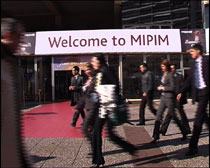 With MIPIM over for another year, thoughts turn to claiming back monies spent over the four-day conference. Samantha McClary explores the expenses system
With MIPIM over for another year, thoughts turn to claiming back monies spent over the four-day conference. Samantha McClary explores the expenses system
With a MIPIM that was back to boom time levels of sociability just over, HR managers across the UK real estate industry are likely to be preparing themselves for an onslaught of eye-watering expense claims.
Indeed, one conversation overheard at Nice Airport on the Friday morning as most of the UK delegation made its way home went something like this:
“So, I just got an e-mail from HR saying that if I had any expenses from MIPIM could I file them by Wednesday.”
Brief pause.
Cacophony of laughter.
“If!”
With little change from a €20 note for just one bottle of beer at Caffe Roma and a mountain of empty bottles by the roadside by the end of each evening, expenses this month are likely to have one or more extra zeros on the end.
But what can businesses do to make sure that they are managed properly and are not abused?
An abuse of expenses came to light in a big way back in 2007 when more than 50 MPs were laid off for misusing the expenses system. And, with UK businesses paying out billions of pounds in expenses each year, making sure that policies are in place and strictly adhered to can have a real impact on the bottom line.
Corporate expense policies are widely ignored. According to Personnel Today data, around 12% of all employee expense claims are outside of an organisation’s corporate policy, yet less than 1% are rejected by managers. Hotel claims are among the most prevalent to be outside company policy.
And according to business software firm Webexpenses, there is a culture of acceptance in British business to stretch the truth when it comes to filling in expense claims. It found that expenses fraud cost UK businesses more than £100m last year, with employees claiming for sundries such a 30p toilet trips at train stations on the way to meetings.
It found that a quarter of employees had made false expense claims at work and that one in five of the 1,000 polled felt no guilt in doing so. More worrying still was that 70% of those claims had never been queried or rejected by their employers.
So, with the boom times back and employees perhaps being a little bit more relaxed with the company credit card, and businesses more willing to flash the cash in these times of healthier top lines, what can be done to make sure policies are clear?
Any expense system should be fair, realistic and easily understood. Both employees and managers need to be properly trained in making expense claims so that they know what is acceptable and what is not, what is needed to make the claim and who to contact if they have any queries.
For a full breakdown of policy and procedure for expense claims, visit www.financial-ombudsman.org.uk/about/employee-expenses.htm
Managing MIPIM expenses
Noel McGonigle, Savills’ head of HR, shares his advice on how to manage MIPIM expenses.
“Entertaining existing and potential clients is a key element of the four days that make up MIPIM, and that brings with it the potential for large expense claims.
“So, how do you make sure that there are no surprises for the company and the individual from entertaining in Cannes? Cannes, as most people attending will know, can be very expensive and it is easy to run up a large bill without realising it.
“The simplest way of avoiding any embarrassment is to issue some guidance on what is and is not acceptable as an expense claim. You can also limit the number of people that are authorised to host clients and set a budget for the cost of entertainment per day or for the event.
“Similarly, hosts can make sure they put a limit on any company tab that is opened. Of course, many organisations have their own client areas, which allow costs to be controlled directly.
“No-one wants to return from a great few days of networking and find their expenses are rejected, so simple guidelines up front can save trouble later.”











